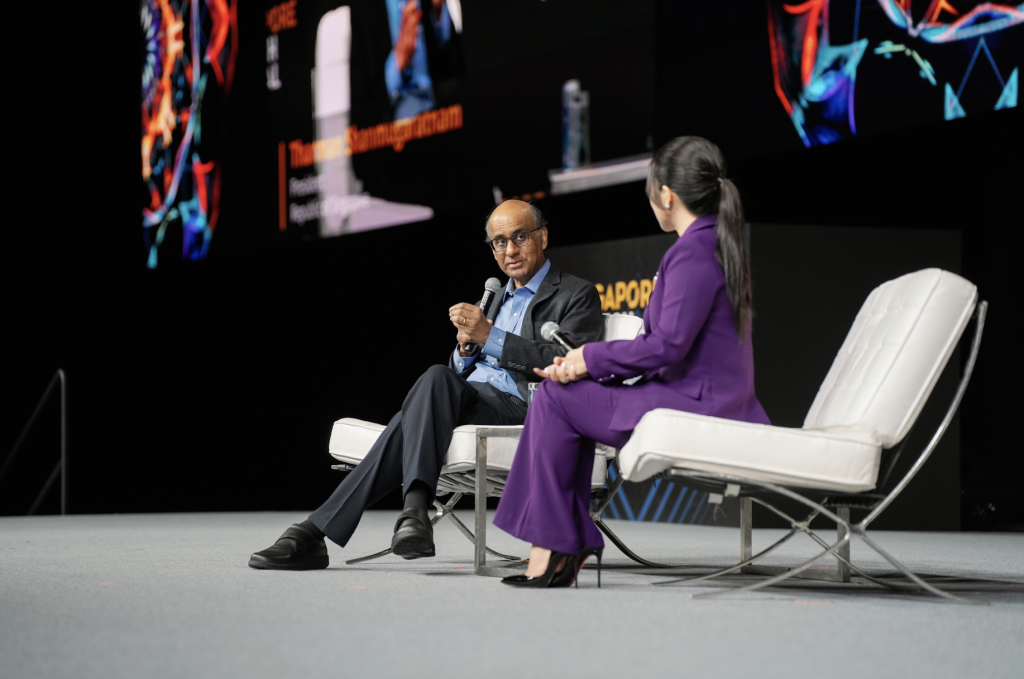[ad_1]
There’s no denying that know-how has drastically impacted the way in which we dwell. Ideas that had been as soon as science fiction at the moment are changing into a actuality with the emergence of applied sciences reminiscent of synthetic intelligence (AI).
These applied sciences, that are reshaping economies and pushing the frontiers of the worldwide digital financial system, result in great potential, but, additionally they include precarious pitfalls — a discourse which has grow to be high of thoughts for a lot of governments and regulators as of late.
On the eight version of the Singapore Fintech Competition at this time (November 15), President Tharman Shanmugaratnam weighed in on a number of key world points regarding the mixing of AI in at this time’s age of know-how and innovation.
AI and LLMs are going to disrupt the workforce at a a lot quicker fee
Since its launch again in November final yr, ChatGPT has been a catalyst for widespread disruption throughout numerous industries. In truth, it took simply 5 days for ChatGPT to achieve 1,000,000 world customers following its launch.
President Tharman believes that Massive Language Fashions (LLMs), like ChatGPT, are going to disrupt and take over jobs at a a lot quicker fee than earlier applied sciences — particularly in relation to these within the monetary providers sector.
Citing a examine executed in the USA, he highlights the truth that no less than 10 per cent of the job features inside 80 per cent of present roles will be simply changed by machine studying and LLMs.
The sooner waves of know-how and automation primarily changed the what we name repetitive jobs, with routine and repetitive work. However what’s attention-grabbing with AI and LLMs is that it’s taking up cognitive duties — duties which are usually executed by people who find themselves higher educated and in reality, these machines are even higher than them.
– Tharman Shanmugaratnam, President of Singapore
That mentioned, the mixing of AI applied sciences into the workforce doesn’t inherently imply that individuals are going to lose their jobs — as an alternative, jobs are going to vary basically.
To this finish, President Tharman shares that this new technological revolution may upend the normal hierarchy of jobs. A better paying job at this time is not going to essentially translate to the next paying job within the years to come back.
This shift is pushed by a reevaluation of the significance of IQ over EQ. Many roles historically thought to require excessive IQ could also be swiftly and extra effectively taken over by LLMs and AI.
Consequently, there arises a must reassess and assign worth to jobs that emphasise EQ, teamwork, and collective creativeness — the roles that require these qualities needs to be recognised and valued accordingly.
The nice and unhealthy of the mixing of AI into the workforce

For mature economies like Singapore, the place there’s a lack of expertise with expertise like programming, the automation of cognitive jobs can show to be advantageous to the city-state. It will cut back its reliance on outsourced expertise and leverage know-how to empower its workforce to “be extra productive and revel in their jobs much more”.
On the flip aspect, growing international locations with surplus expertise shall be hit in areas like enterprise course of outsourcing (BPO) or the export of ICT providers. Nonetheless, President Tharman emphasises that societies with strong “public, non-public, and authorized coordination” shall be “well-placed to deal with these points”.
As AI displaces a big band of white-collar employees who’re tasked with “mid-level cognitive duties” and even “higher mid-level cognitive duties”, it’s necessary for organisations inside a rustic or society to get collectively to offer these employees with alternate options to their present job scope, both by equipping them with a brand new job or by educating them on methods to leverage rising tech and supply added worth.
“You possibly can’t simply go away it to particular person companies and particular person employees. It’s a collective activity and we have to organise ourselves as a social organisation to deal with this,” says President Tharman.
Mitigating the security dangers of AI
Though the utilization of AI and machine studying throughout numerous sectors can open up boundless prospects, President Tharman underscores the equally vital potential of AI that may result in “unintended catastrophic outcomes”.
Whereas he acknowledges that it’s “too early” to impose regulation, President Tharman emphasises that human intervention and world coordination is significant to mitigate the dangers of those instruments.
Take the healthcare sector, for example. Whereas AI shall be an enormous enabler in relation to each analysis and the therapy of ailments, human judgement remains to be integral to make sure the moral utilization of those instruments.
On a broader scale, in relation to nationwide and world safety, the President advocates for a collective worldwide effort in danger mitigation, asserting the need of a worldwide coalition of nations. This collaborative effort is particularly necessary in relation to sustaining democracies, particularly in an period the place subtle pretend data will be simply unfold throughout client populations.
Once you mix [deep fakes] with social media algorithms, you may suppose that you just’re changing into extra open-minded whereas being uncovered to totally different concepts. However in actuality, what occurs is that you just grow to be extra bolstered in your views and typically, your feelings. This systematically results in polarisation.
The mixture of AI deep fakes and the algorithms of the social media platforms is a really severe situation for the flourishing of democracy.
– Tharman Shanmugaratnam, President of Singapore
Regardless of these challenges, it’s necessary to embrace technological innovation like AI and wield it as a optimistic instrument of change to construct a extra sustainable and inclusive world — and the important thing to this lies in collaboration.
Featured Picture Credit score: Singapore Fintech Competition
[ad_2]
Source link



